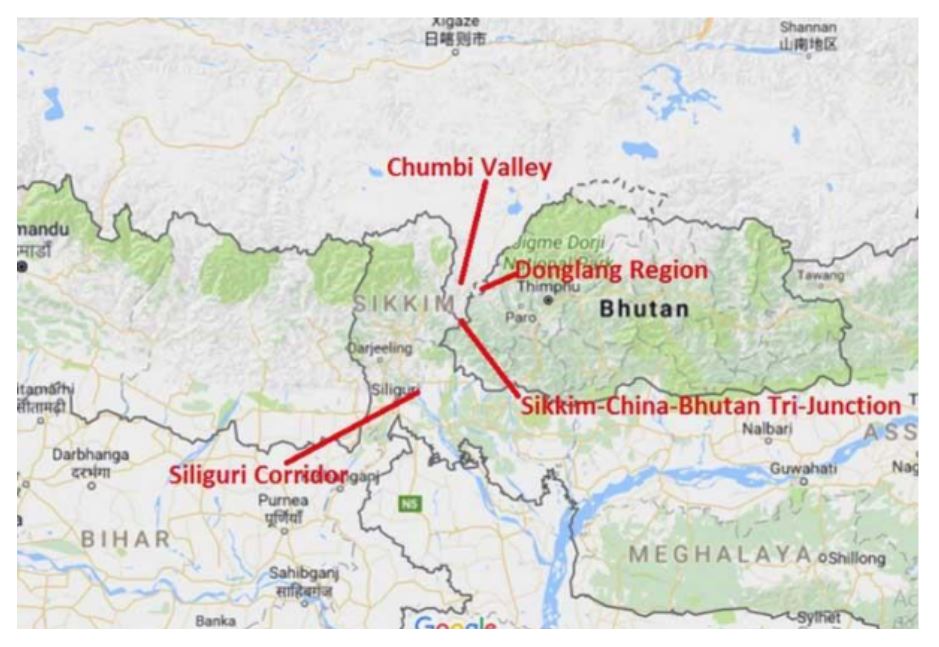All India Radio
Bhutan India Bilateral Relations
Listen to the Spotlight here: http://www.newsonair.com/Main_Audio_Bulletins_Search.aspx
TOPIC: General Studies 2
- India and its neighbourhood- relations.
- Bilateral, regional and global groupings and agreements involving India and/or affecting India’s interests
In News: India and Bhutan held talks on development cooperation and Indian projects in the country during a meeting between Prime Minister Narendra Modi and his Bhutanese counterpart Tshering Tobgay.
The Bhutanese King’s visit assumes importance especially as it comes soon after India’s bitter military stand-off with Chinese forces that took place in the Doklam plateau region in Bhutan, which is close to the India-China-Bhutan tri-junction.
Bhutan and India have a unique relationship matched by no two other countries. This is a relationship based on trust, built brick by brick from the Treaty of Friendship signed in Darjeeling in 1949. While Bhutan all through the years has appreciated India for its economic assistance, India, for its part, has been sensitive to Bhutan’s developmental needs.
During the recent meeting, the two prime ministers
- Reaffirmed their resolve
- to enhance co-operation in all areas of mutual interest
- To take the “exemplary bilateral partnership to new heights for the benefit of the two peoples”.
- Reviewed the bilateral economic and hydro-power co-operation, including the progress in implementation of the India assisted-hydro-electric projects in Bhutan
- Modi complimented Bhutan government on its imminent graduation to a middle-income country, and for achieving economic progress while preserving its traditions and values, and combining sustainable development with enhanced happiness quotient of its people.
The two countries are expected to further boost defence, security and strategic cooperation in view of recent developments on the region and also globally.
50 years of Diplomatic Relations
As India and Bhutan celebrate 50 years of diplomatic relations this year, it presents both the countries with an opportunity to reflect about further advancing ties between the two countries. It is a unique partnership built on the historical and cultural linkages between the two countries
Bhutan’s Significance to India
Geography
-
- Bhutan’s significance to India stems from its geographic location. Nestled in the Himalayas, it is sandwiched between India and China. Thus, it serves as a buffer between the two Asian giants. Bhutan’s value as a buffer soared after China annexed Tibet in 1951.
- As the 2017 crisis in the Doklam region revealed, India will strongly oppose, even militarily, any Chinese attempt to assert control over mDoklam. Securing Bhutan’s present borders especially its western border is clearly important for India.
- Doklam in the hands of a hostile power would heighten the vulnerability of India’s Siliguri Corridor, a narrow strip of land that links India to its Northeastern states. So vital is Doklam to India’s defence that India has a permanent and sizeable military contingent and an army hospital in Haa district, where Doklam is located.
Economy
- India dominates Bhutan’s economy. It is Bhutan’s largest trade partner; around 79% of Bhutan’s total imports are from India and India provides a market for 90% of its exports.
- Additionally, India is Bhutan’s largest aid donor. Between 2000 and 2017, Bhutan received $4.7 billion in aid from India, the lion’s share of India’s total foreign aid.

Energy, Infrastructure & Security
- Bhutan is a strategically important country for India due to its location, and both sides have been ramping up overall cooperation, including in areas of defence and security, and energy, over the past a few years.
- India’s Border Roads Organisation has completed construction of a strategically key road in Bhutan, linking the neighbouring country’s border town of Phuentshogling with its capital city of Thimphu.
- Under the 2007 India-Bhutan Friendship Treaty, the two sides have agreed to “cooperate closely with each other on issues relating to their national interests. Neither Government shall allow the use of its territory for activities harmful to the national security and interest of the other.” During the Doklam standoff between troops of India and China last year, Bhutan had extended support to New Delhi
The Way Ahead
- India needs to act robustly to address Bhutanese concerns that are weakening the traditionally strong India-Bhutan bilateral bond, as a strong relationship with India could reduce the chances of Bhutan succumbing to Chinese pressure.
- A politically stable Bhutan is important to India. An unstable and restive Bhutan would not only jeopardize India’s investments in that country but also provide a safe haven for anti-India activities and anti-India militant groups.
- India needs to discard the tradition of offering economic subsidies and negotiating project proposals with neighbouring capitals and focus instead on enabling agreements, and let market forces leverage the existing economic and geographic complementarities.
- Demonetisation, GST have impacted on the ground in the Indo-Bhutanese relationship as well as with Nepal. GST has created a lot on confusion within Bhutan in terms of trade. The economy is small and largely dependent on Indian export. So these issues were required to be discussed.
Connecting the dots:
- Bhutan is India’s most trusted partner but it shouldn’t be taken for granted. Critically analyse relation between both countries.











